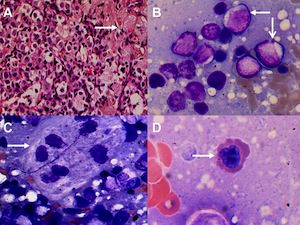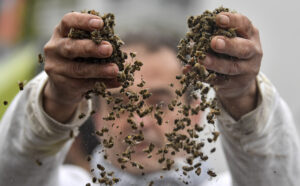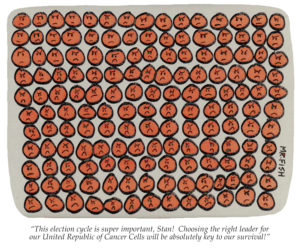One Drug to Shrink All Tumors?
A single drug has proven capable of shrinking or curing human breast, ovarian, colon, bladder, brain, liver and prostate tumors that were transplanted into mice by overriding a chemical that normally blocks the immune system from destroying cancer cells.
A single drug has proven capable of shrinking or curing human breast, ovarian, colon, bladder, brain, liver and prostate tumors that were transplanted into mice by overriding a chemical that normally blocks the immune system from destroying cancer cells.
Stanford University biologist Irving Weissman first noticed the protective CD47 protein, which exists within cancerous as well as healthy cells, a decade ago. In the last few years, his lab was able to inhibit the production of that protein in cancer cells, thus allowing the body to recognize them as invaders.
Initially the discovery related only to leukemia. Now Weissman and his colleagues have shown it could impact many more types of cancer.
Cancer researcher Tyler Jacks of the Massachusetts Institute of Technology warns that study on humans is needed before the drug can be declared effective. “The microenvironment of a real tumor is quite a bit more complicated than the microenvironment of a transplanted tumor,” he notes, “and it’s possible that a real tumor has additional immune suppressing effects.” It is also not known whether the drug’s effect would be nullified through interaction with existing treatments.
Weissman’s team has received $20 million from the California Institute for Regenerative Medicine to begin testing on humans. “We have enough data already,” he said, “that I can say I’m confident that this will move to phase I human trials.”
— Posted by Alexander Reed Kelly.
Your support matters…Science NOW:
To determine whether blocking CD47 was beneficial, the scientists exposed tumor cells to macrophages, a type of immune cell, and anti-CD47 molecules in petri dishes. Without the drug, the macrophages ignored the cancerous cells. But when the CD47 was present, the macrophages engulfed and destroyed cancer cells from all tumor types.
Next, the team transplanted human tumors into the feet of mice, where tumors can be easily monitored. When they treated the rodents with anti-CD47, the tumors shrank and did not spread to the rest of the body. In mice given human bladder cancer tumors, for example, 10 of 10 untreated mice had cancer that spread to their lymph nodes. Only one of 10 mice treated with anti-CD47 had a lymph node with signs of cancer. Moreover, the implanted tumor often got smaller after treatment — colon cancers transplanted into the mice shrank to less than one-third of their original size, on average. And in five mice with breast cancer tumors, anti-CD47 eliminated all signs of the cancer cells, and the animals remained cancer-free 4 months after the treatment stopped.
“We showed that even after the tumor has taken hold, the antibody can either cure the tumor or slow its growth and prevent metastasis,” says Weissman.
Independent journalism is under threat and overshadowed by heavily funded mainstream media.
You can help level the playing field. Become a member.
Your tax-deductible contribution keeps us digging beneath the headlines to give you thought-provoking, investigative reporting and analysis that unearths what's really happening- without compromise.
Give today to support our courageous, independent journalists.






You need to be a supporter to comment.
There are currently no responses to this article.
Be the first to respond.